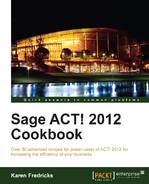With so many search options it seems like ACT! surely has all the bases covered. However, there are a few lookup limitations. Fortunately, the new ACT! 2012 universal search feature overcomes those obstacles.
The universal search differs from a traditional lookup in a number of ways:
- In addition to search through contacts, groups, companies, opportunities, notes, history, and activities, the universal search can also search your attachments.
- You can filter your search criteria by all dates, the last 24 hours, last week, or last month.
- Your results can be sorted.
- You can double-click on an item of interest to be taken to that particular linked field or attachment and then use the Back button to view the search results again.
- You can use special query characters to further define your search.
Let's say for example that you are looking for everyone that requested a proposal from you. You could search by keyword and have ACT! hunt through all your notes looking for the word "proposal". However, you might end up with far too many matches. By using the universal search you can sort the matching items by date, showing the most recent first. At that point, you can double-click on an item to hone in on a particular field or attachment. And, if you still haven't found what you're looking for, you can use the back button to view the search results page again or to refine your search.
- Type your search term in the Search text box to the right of the global toolbar.
- Click Go or click the Enter key on your keyboard.
- (Optional) If search does not find anything, a message appears like the one in the following screenshot. Fill in a different search term, and click Go.

- The universal search results appear in columns showing the record type, name, and last edited date. The following screenshot shows you a sample of a universal search results:

- (Optional) If the search returned too many results you can narrow the results by removing the checkboxes in the Show Only area and Last Edited filters located to the right of the results.
- Click an item's hyperlink to access the record.
- (Optional) Click the Back button on the global toolbar if you need to return to the Search results from a contact, company, group or opportunity record, or close the Note, History, or Activity.
- (Optional) Remove the text in the Search box, type in a new term, and then click Go to search for a different term.
- Click any button on the Navbar to exit the search pane.
For some unexplained reason, the lookup area at the top of the Navbar disappeared in ACT! 2012. Perhaps Sage thought ACT! users might be confused by having a lookup option on the top left of the screen and a search option at the top right. Hopefully, the lookup area will return to the Navbar in later revisions of ACT! 2012.
You can use special characters and operators in your universal search. A few of the common search characters include:
- Question mark (?): Replace a single unknown character. For example, searching for "bike?" will return anything containing the word bikes.
- Asterisk (*): Replaces an unknown number of characters in your search term. For example, searching for "Tech*" will return TechONE, Tech Benders, and Technology.
- Pound (#): Searches phonetically. For example "#Brian" will return both Bryan
